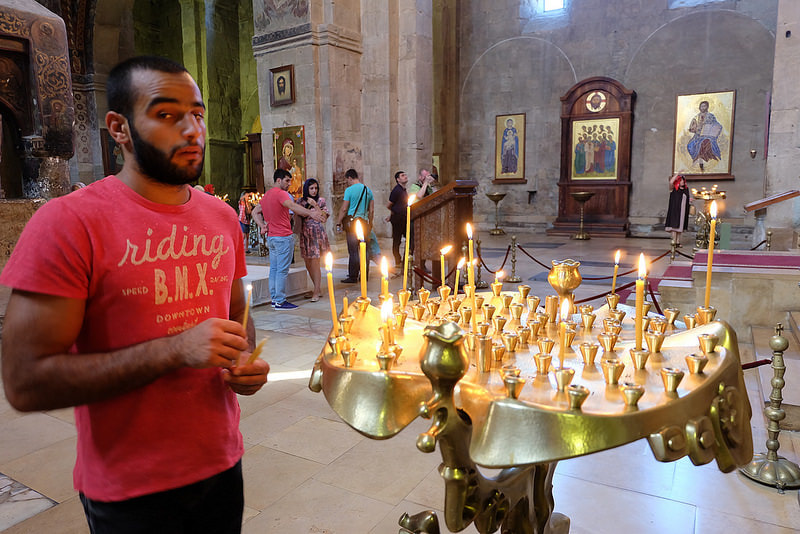From Me to You
Process Theology and Prayer
There are so many kinds of prayer and so many ways to pray. We can pray with words and without words. We can pray by reaching out into a vast mystery, the Deep Listening, saying "help" or "thanks" or "wow." [1] And we can pray by resting in a silence of our own hearts, without saying anything, sensing that all things are enfolded in a love beyond our understanding, yet also within each of us.
How might we name these two kinds of prayer? I will speak of them as "reaching out" prayer and "contemplative" prayer. Both kinds of prayer make good sense from a process perspective, but here I want to put in a word for "reaching out" prayer. I focus on reaching out prayer because I meet people who somehow think that it is inferior to contemplative prayer. They prefer quiet sitting, without words, to saying “help” or “thanks” or “wow.” They are suspicious of the idea that the universe includes a Someone who receives and responds to prayers, perhaps because this Someone is too often imagined in overly anthropomorphic terms: a king on a throne.
But we process thinkers believe that the Someone can be imagined on the analogy of a cosmic self whose very body is the universe. The Someone who hears prayer is the very Soul of the universe and her name is Love.
For us Love, human or divine, has two sides. It always begins with listening, with feeling the feelings of others, with empathy. It is vulnerable: sharing in the sufferings of others and also the joys like a loving parent. Love then responds to what is felt by offering possibilities for healing and wholeness, for spiritual aliveness, relative to the circumstances at hand. Love listens and responds, listens and responds, listens and responds, again and again, like a loving Abba, or a Buddhist Bodhisattva. Love is patient and kind. Love is not a king on a throne.
Me to You
"Reaching out" prayer is an act of reaching into, of giving yourself to, the receptive side God, to the Love that is always listening. This “reaching out” is not a denial of individuality; to the contrary it is an act of self-expression, of saying "here I am" to the Self in whose love all things unfold. It is establishing a relationship between You and You: one of them human and the other divine.
Imagine a Buddhist lighting incense and placing it in front of a statue of Kuan-Yin, and then bowing. Or a Christian doing the same before an icon of Mary. In the folding of the hands, in the kneeling, both are placing themselves in the presence of the deep Listening. They are doing the Great Work.
Hear the words of Frederic and Mary Ann Brussat on the practice of You:
The spiritual practice of you challenges us to become all we are meant to be as God's beloved sons and daughters. We are, after all, co-creators of the Great Work of the universe. By attuning ourselves to what in different traditions has been called the image of God, the everlasting soul, or the higher self, we are able to fulfill our mission in life.
If we think of prayer as a practice of You, as a Great Work, then from a process perspective every entity of any sort is doing this all the time, naturally. Everything is expressing itself into God just in being itself. We humans can turn to God in an intentional way, addressing our prayers to God. But everything does this in a natural way. Everything, not just human beings, is a You in its own way. In the language of process theology, each actuality in the universe is a concrescing subject with aims of its own.
“The heavens and earth declare the glory of God,” says the Psalmist. In our time, it can help us humans to realize that, in praying, in addressing God, we are joining a cosmic chorus. Even the stars pray.
Of course there is a question that emerges: “How does God respond, if at all? After the deep Listening feels our feelings, what does she do? Can she make everything alright? Can she operate like a king on a throne?”
For us process thinkers, the answer is No. The deep Listening can indeed respond by offering us possibilities for healing and wholeness, for growth, relative to the circumstances of our lives. With our cooperation she can indeed heal and transform. But she is not a puppeteer. Her You needs our You, and ours Hers. In a way, She, too, prays. God’s prayer is that her will be done on earth as in heaven, for our sake and for hers. When we answer God’s prayer, when we love our neighbors as ourselves, we are helping God’s realize her aims. Even she can pray in her way. Even she can say “help” and “thanks” and “wow.”
[1] Here I am borrowing from the best-selling book by Anne Lamott: Help, Thanks, Wow: The Three Essential Prayers.
How might we name these two kinds of prayer? I will speak of them as "reaching out" prayer and "contemplative" prayer. Both kinds of prayer make good sense from a process perspective, but here I want to put in a word for "reaching out" prayer. I focus on reaching out prayer because I meet people who somehow think that it is inferior to contemplative prayer. They prefer quiet sitting, without words, to saying “help” or “thanks” or “wow.” They are suspicious of the idea that the universe includes a Someone who receives and responds to prayers, perhaps because this Someone is too often imagined in overly anthropomorphic terms: a king on a throne.
But we process thinkers believe that the Someone can be imagined on the analogy of a cosmic self whose very body is the universe. The Someone who hears prayer is the very Soul of the universe and her name is Love.
For us Love, human or divine, has two sides. It always begins with listening, with feeling the feelings of others, with empathy. It is vulnerable: sharing in the sufferings of others and also the joys like a loving parent. Love then responds to what is felt by offering possibilities for healing and wholeness, for spiritual aliveness, relative to the circumstances at hand. Love listens and responds, listens and responds, listens and responds, again and again, like a loving Abba, or a Buddhist Bodhisattva. Love is patient and kind. Love is not a king on a throne.
Me to You
"Reaching out" prayer is an act of reaching into, of giving yourself to, the receptive side God, to the Love that is always listening. This “reaching out” is not a denial of individuality; to the contrary it is an act of self-expression, of saying "here I am" to the Self in whose love all things unfold. It is establishing a relationship between You and You: one of them human and the other divine.
Imagine a Buddhist lighting incense and placing it in front of a statue of Kuan-Yin, and then bowing. Or a Christian doing the same before an icon of Mary. In the folding of the hands, in the kneeling, both are placing themselves in the presence of the deep Listening. They are doing the Great Work.
Hear the words of Frederic and Mary Ann Brussat on the practice of You:
The spiritual practice of you challenges us to become all we are meant to be as God's beloved sons and daughters. We are, after all, co-creators of the Great Work of the universe. By attuning ourselves to what in different traditions has been called the image of God, the everlasting soul, or the higher self, we are able to fulfill our mission in life.
If we think of prayer as a practice of You, as a Great Work, then from a process perspective every entity of any sort is doing this all the time, naturally. Everything is expressing itself into God just in being itself. We humans can turn to God in an intentional way, addressing our prayers to God. But everything does this in a natural way. Everything, not just human beings, is a You in its own way. In the language of process theology, each actuality in the universe is a concrescing subject with aims of its own.
“The heavens and earth declare the glory of God,” says the Psalmist. In our time, it can help us humans to realize that, in praying, in addressing God, we are joining a cosmic chorus. Even the stars pray.
Of course there is a question that emerges: “How does God respond, if at all? After the deep Listening feels our feelings, what does she do? Can she make everything alright? Can she operate like a king on a throne?”
For us process thinkers, the answer is No. The deep Listening can indeed respond by offering us possibilities for healing and wholeness, for growth, relative to the circumstances of our lives. With our cooperation she can indeed heal and transform. But she is not a puppeteer. Her You needs our You, and ours Hers. In a way, She, too, prays. God’s prayer is that her will be done on earth as in heaven, for our sake and for hers. When we answer God’s prayer, when we love our neighbors as ourselves, we are helping God’s realize her aims. Even she can pray in her way. Even she can say “help” and “thanks” and “wow.”
[1] Here I am borrowing from the best-selling book by Anne Lamott: Help, Thanks, Wow: The Three Essential Prayers.



